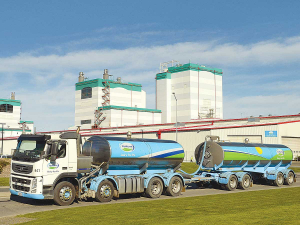Dedoncker Departs Fonterra After Mainland Group Sale
Fonterra executive René Dedoncker is leaving the co-operative later this year to lead Australian agribusiness Elders.
 Fonterra says, at this stage, it hasn’t experienced any significant interruption in its supply chain.
Fonterra says, at this stage, it hasn’t experienced any significant interruption in its supply chain.
For the country’s two largest milk processors, it’s business as usual: milk is coming in, being processed and products shipped to offshore markets without any major hitch.
Both Fonterra and Open Country Dairy say they are not facing shortage of shipping containers as Covid-19 wreaks havoc globally.
Fonterra’s director global supply chain, Gordon Carlyle says at this stage, the co-op hasn’t experienced significant interruption in its end-to-end supply chain.
Carlyle says farmers’ milk is still being collected and processed as normal and collection volumes are not “wildly different” to previous seasons at this time of year, considering this season’s challenges included a significant drought in the North and flooding in the South.
This time last year Fonterra’s full year milk forecast was 1,530 million kgMS: this year, the co-op is sitting at 1,515 million kgMS to the end of the season. “We would update the market if the milk forecast changed,” Carlyle told Rural News.
Fonterra’s isn’t experiencing any issues with exports leaving NZ ports: while some ports in some markets have slowed, Fonterra exports are still getting through.
“We haven’t experienced any shortages of shipping containers or chilled capacity.
“As part of our business continuity plan; we have identified extra storage space, but as of yet we have not needed it. At this time of year, we generally always have storage over and above our fixed footprint.”
Carlyle says one of Fonterra’s advantages is its scale: both in manufacturing, product mix and international marketplaces.
“We have the ability to flex and change to adapt to hot-spots around the world. This is a key benefit of having a global customer base and multiple selling platforms – consumer, food service, supply contracts, GDT and spot sales.”
OCD chief executive Steve Koekemoer told Rural News most of its markets are also operating as essential services: customers continue to manufacture as normal in the food sector.
“Our sales team carries on selling as per our policy, and we see continued demand for dairy products.”
Like Fonterra, OCD’s milk volumes are tracking close to forecast.
“We might experience inefficiencies here and there as everybody settles into the new norm. But we have, so far, not had any restrictions on ordering raw materials or shipping containers, which is a better result than many would have expected at this point in the process,” he says.
“The milk is coming into the sites and volumes are tracking to forecast.”
Former Fonterra executive Alex Turnbull has been appointed CEO to lead all five Yili Oceania Business Division companies in New Zealand.
Fonterra executive René Dedoncker is leaving the co-operative later this year to lead Australian agribusiness Elders.
Alliance Group and the Southland Stags rugby team have joined forces in a partnership that will see the the meat co-operative's farmgate brand feature on players' team kits and replica jerseys.
Fonterra's plan to expand its organic programme to the South Island is being well received by farmers, the co-op says.
Voting has started for the renewal of DairyNZ's milksolids levy.
The most successful catchment groups in NZ are those that have 'a source to sea' approach.

OPINION: Here w go: the election date is set for November 7 and the politicians are out of the gate…
OPINION: ECan data was released a few days ago showing Canterbury farmers have made “giant strides on environmental performance”.